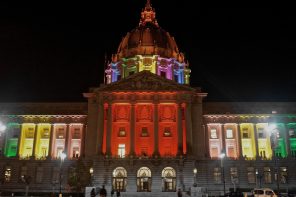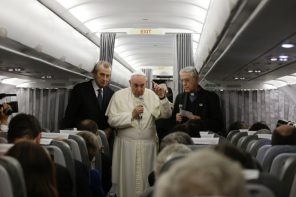Houston. Atlanta. Big southern cities with liberal mayors facing a backlash from conservatives, claiming actions by those mayors pertaining to LGBT rights violate religious freedom.
In Houston last year, the controversy was over Mayor Annise Parker’s administration subpoenaing pastors in litigation over whether signatures for a voter referendum on an anti-discrimination ordinance were valid. The incident galvanized the religious right nationally, with activists turning a local issue into an overblown symbol of what’s left of the fight against LGBT equality: the claim that LGBT rights infringe on the religious freedom of the people who oppose those rights.
The Atlanta incident arises out of Mayor Kasim Reed’s firing of Fire Chief Kelvin Cochran, initially reported as stemming from Cochran’s anti-gay comments in his book, Who Told You That You Were Naked? In the book, Cochran wrote, “Uncleanness – whatever is opposite of purity; including sodomy, homosexuality, lesbianism, pederasty, bestiality, all other forms of sexual perversion,” and “Naked men refuse to give in, so they pursue sexual fulfillment through multiple partners, with the opposite sex, the same sex, and sex outside of marriage and many other vile, vulgar and inappropriate ways which defile their body – temple and dishonor God.”
Reed said the firing wasn’t an issue of religious freedom or free speech, but rather one of judgment. Indeed an internal report released to the media reveals that Reed took action not because of the content of Cochran’s book per se, or even because of how his views affected his treatment of LGBT employees (apparently not negatively), but because he had written and distributed the book without proper clearance. According to WGCL:
The announcement of Cochran’s firing comes after he was suspended for one month without pay after publishing the book that Reed said contained, “disturbing sentiments about the LGBT community.”
Reed listed among the reasons motivating his decision the fact that Cochran wrote a book with inflammatory language without asking permission from him and that he spoke out during the investigation.
Reed stressed that this was not about Cochran’s religious beliefs, but about the judgment to publish a book that could open the City of Atlanta to lawsuits without discussing it with senior leadership.
Reed also asked people to stop calling his home and asking for Cochran to be reinstated. He said people have been calling him and calling him names, like “Antichrist.”
Cochran did speak with the city’s ethics advisor on multiple occasions about the book, Reed said. He added that she advised him not to publish it.
If calling the mayor at home and calling him the Antichrist seems extreme, check out Erick Erickson, who proclaimed, “Je suis Kelvin Cochran,” and compared Cochran to the murdered Charlie Hebdo journalists. (See, they both published something that offended “terrorists.”) Franklin Graham also came to Cochran’s defense, calling him “a fearless man of great faith,” and accusing the LGBT community of “want[ing] us to cower in the face of their threats to the livelihoods of believers.”
These are not local incidents anymore. They are driving religious advocacy as activists portray them as evidence of a broader claim for which they have sparse evidence: discrimination against Christians.
Faith-Driven Consumer, which has generated a petition calling for the fire chief’s reinstatement, calls Cochran’s firing “un-American” and evidence of “intolerance, bigotry and discrimination.”
Charisma columnist Michael Brown predicts that in 2015 “the gay revolution will continue to overplay its hand,” arguing that “as gay activists win more and more battles in the courts and the society, that will actually work against them, and their goals will continue to become more and more extreme.”
Brown is not clear what those “extreme” goals are, although the implication by Cochran’s defenders is that LGBT rights advocates aim to silence and exclude their opponents from public life on religious grounds. But Cochran’s rights as a citizen to speak, to evangelize, to pontificate, have limits in the context of his responsibilities as an official sworn to uphold the public trust, and to treat all members of his community equally. And his religious views aren’t entitled to special treatment because they involve his views on sexuality — surely there are “religious” views that would never be tolerated for a moment if expressed by a public official.
Cochran’s defenders are trying to blur the line between his right to hold private views and his duties as a public official, to make his private beliefs, publicly expressed, absolutely protected regardless of their context or impact. It’s that line — not the right to marry, or the right to speak, or the right to practice religion — between the private and the workplace that will animate anti-LGBT activism, unless or until fatigue sets in.





